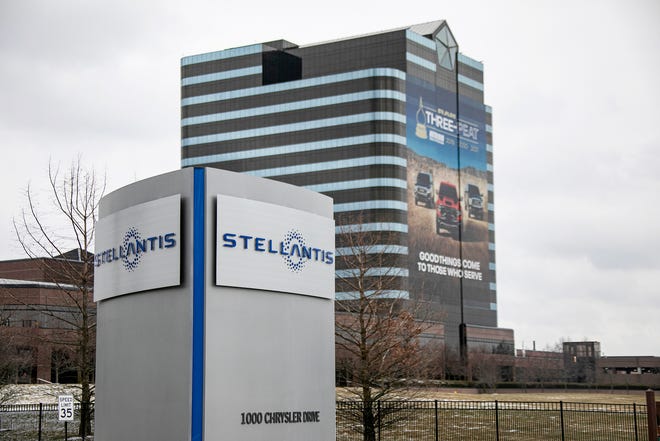Stellantis is adding billions of dollars to its available credit, giving itself more of a cushion as the auto industry continues to grapple with a microchip shortage affecting production of new vehicles that does not appear to be letting up.
The automaker announced Friday that it had signed a new revolving credit facility of approximately $14 billion (12 billion euros) with a group of 29 banks.
The deal means an expansion of the credit the company already had available.
Stellantis, maker of Ram trucks and Jeep SUVs, formed in January from the merger of Fiat Chrysler Automobiles and Peugeot maker PSA Group.
The new credit lines replace a $3.5 billion (3 billion euro) line through PSA and a $7.4 billion (6.25 billion euro) line through FCA. They’ll be split into two equal pieces, one with a three-year term and one with a five-year term and the option to extend both for an additional year, the company said.
In its announcement of the agreement, Stellantis highlighted the “increase in the group’s overall liquidity” as well as the extension of the terms.
“This successful transaction confirms the strong support to Stellantis from its international relationship banks,” the company said in a news release.
The company, which is preparing to release its earnings for the first half of 2021 on Aug. 3, issued a scaled-down financial report to mark the end of the first quarter, with the expectation that the half-year release would include a full picture of the company’s earnings. In that first-quarter release in May, the company said it had net revenues of $41.2 billion (34 billion euros) since the merger on Jan. 17.

The move to secure more credit has echoes of actions the companies took last year as the early effects of the coronavirus pandemic were hitting the auto industry. Automotive production shutdowns related to the virus were widespread globally last spring, but as recently as last week, Stellantis was prompted to halt a shift at a Vauxhall van plant in the United Kingdom over virus concerns.
More:Stellantis CEO on weather events pushing electrification: Our company is ready
More:Stellantis picks Amazon Alexa executive as chief technology officer
More:Stellantis announces plans to build electric Ram 1500, Dodge muscle car in 2024
One of the primary stresses on the industry at the moment is the global chip shortage, which has upended production at automakers around the globe. Stellantis, which is headquartered in the Netherlands, had managed to maintain production at the Sterling Heights Assembly Plant in Michigan, where it builds the Ram 1500 pickup, one of its most profitable vehicles, but that changed earlier this month when it suspended production even there.
General Motors announced a pause this week to most of its full-size pickup production in North America. Ford has also dealt with various production shutdowns because of the chip shortage.
In a webcast with reporters this week, Stellantis CEO Carlos Tavares said he expects the chip shortage to continue into next year.
In its first-quarter results, Stellantis had said it lost 11% of planned production, or 190,000 vehicles, during the quarter and it expected a bigger hit in the second.
In a filing this year with the U.S. Securities and Exchange Commission, Stellantis explained that the pandemic had put “significant pressure” on the company’s liquidity, leading to an increase in the level of indebtedness. The company said its liquidity “could also be adversely affected if our vehicle shipments decline materially, whether as a result of COVID-19 or otherwise.”
Contact Eric D. Lawrence: elawrence@freepress.com. Follow him on Twitter: @_ericdlawrence. Become a subscriber.